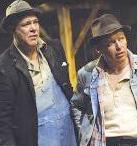SEARCH CurtainUp
REVIEWS
FEATURES
NEWS
Etcetera and
Short Term Listings
LISTINGS
Broadway
Off-Broadway
BOOKS and CDs
OTHER PLACES
Berkshires
London
LA/San Diego
Philadelphia
Elsewhere
QUOTES
On TKTS
LETTERS TO EDITOR
FILM
LINKS
MISCELANEOUS
Free Updates
Masthead
NYC Weather
 London Review
London Review
Of Mice and Men
by Lizzie Loveridge
|
Jesus you feel free when you ain't got a job . . . if you ain't hungry. --- George |

Matthew Kelly as Lennie and George Costigan as George
(Photo: Robert Day) |
The story is well known and its core narrative endures, the responsibility for caring for an adult who is disabled and too innocent, too na´ve to cope alone and the resulting tragedy when that burden proves too onerous. Set in the desperate days of scraping a living from the land in Northern California in the 1930s, we are reminded of how difficult mere existence is for many. The dreams of these casual labourers are the dreams of the characters in Eugene O'Neill's The Iceman Cometh, their chances of fulfilment just as improbable. The only drawback of dramatising the novel is that so much of the book is narrative and this results in a first half mostly of long descriptive dialogue rather than dramatic event. But the second half has considerably more dramatic turn and tragedy.
The staging and lighting are of the very best. The opening scene quite takes one's breath away. Outlined against the smoky, red lit sky, sheaves of barley ranked in lines, a stream running along the stage, the shadowy figures of George (George Costigan) and Lennie (Matthew Kelly) make their entrance to the sound of Blue grass folk music. The bunkhouse is all slatted wood walls, dividing the light into shafts, illuminating the beds in this bare dormitory for the farm workers. A third magnificent set, the barn with its straw bales and corrugated iron must make this production in the running for an award for its recreation of rural atmosphere.
George Costigan gives a remarkable performance as George the man who has the burden of looking after Lennie. It isn't just that Lennie is simple but that his size and strength make him a danger both to the mice he so desperately wants to pet and to other people. Costigan's performance is special because of his weary blend of exasperation and compassion. Matthew Kelly gives an interesting portrait of the childlike Lennie. Very tall and ungainly, a round hat pulled down over his ears, with his wrists poking out from his shirt cuffs, he holds his hands with fingers stiff and splayed. Lennie is not so innocent that he cannot manipulate George, wheedling for what he wants. George is forced to agree because Lennie threatens to go and live in a cave. Kelly speaks his part with the voice of a child.
There are sterling ensemble performances from those involved on the farm as hirers or the hired including Rachel Kavanaugh's delightful dog Josie (last seen in Two Gentlemen of Verona at Regent's Park). Tyrone Huggins is memorable as the African American worker who is at first wary of Lennie. When Candy (David Sterne) waits to hear the gunfire as his dog is shot, the tension is all, a clock ticks persistently and the wait seems interminable. The accents are occasionally more Southern than rural Californian but passable.
This adaptation really works, is visually stellar and makes a welcome seven week stay in the West End.
| Of Mice and Men
Written by John Steinbeck Directed by Jonathan Church Starring: Matthew Kelly, George Costigan With: David Sterne, Nick Stringer, John Flitcroft, Joanne Mosley, Julian Protheroe, Neil Phillips, Tom Silburn, Tyrone Huggins, Andy Chaplin, Philip Bulcock Designer: Simon Higlett Lighting Designer: Tim Mitchell Music: John Tams Running time: Two and a half hours with one interval Box Office: 0870 164 8787 Booking to 6th December 2003. Reviewed by Lizzie Loveridge based on 23rd October 2003 Performance at the Savoy Theatre, The Strand, London WC2 (Tube: Charing Cross) |


Mendes at the Donmar
Our Review

Peter Ackroyd's History of London: The Biography

London Sketchbook

Somewhere For Me, a Biography of Richard Rodgers

At This Theater

Ridiculous!The Theatrical Life & Times of Charles Ludlam

The New York Times Book of Broadway: On the Aisle for the Unforgettable Plays of the Last Century

6, 500 Comparative Phrases including 800 Shakespearean Metaphors by CurtainUp's editor.
Click image to buy.
Go here for details and larger image.



